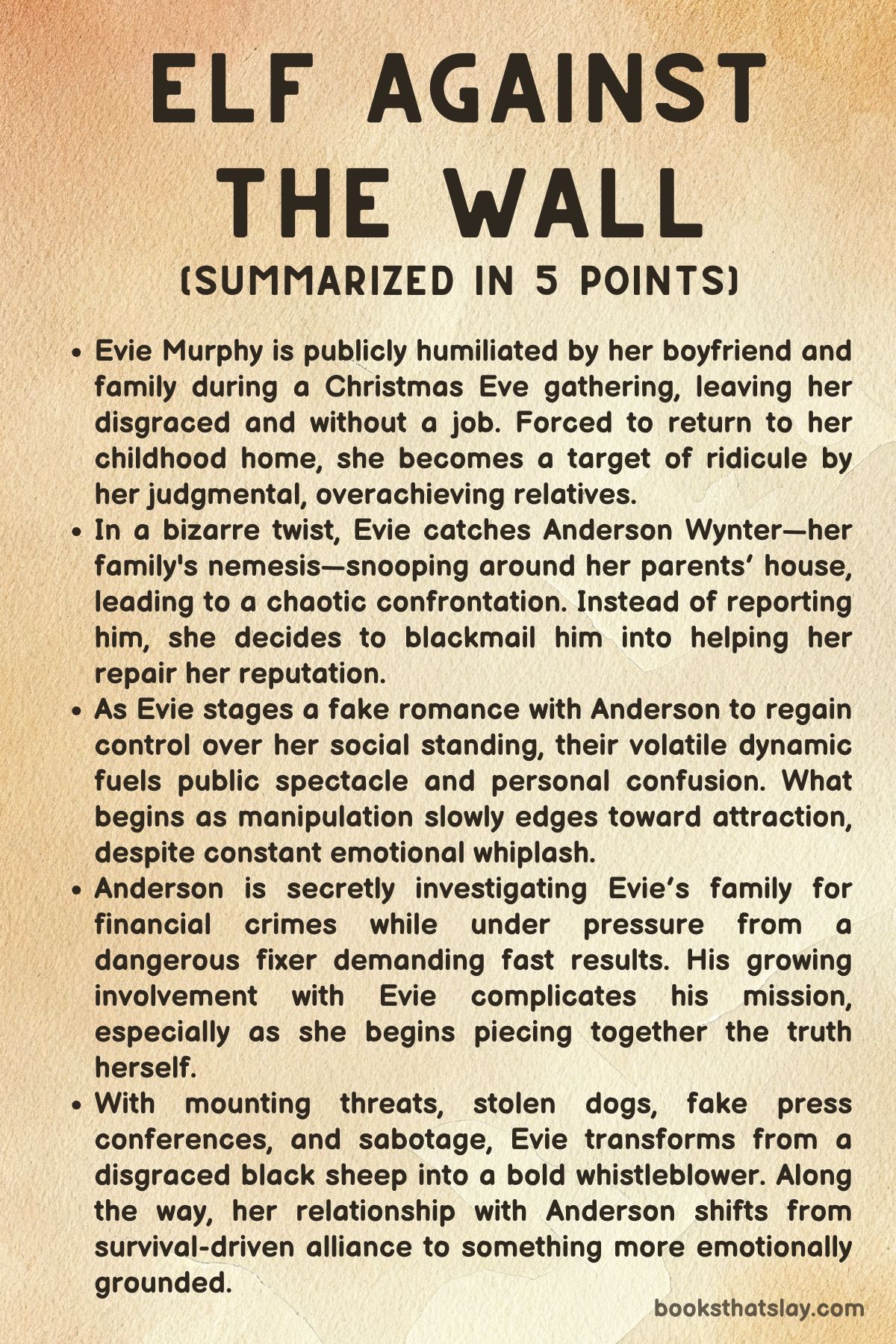Elf Against the Wall Summary, Characters and Themes
Elf Against the Wall by Alina Jacobs is a chaotic, hilarious, and emotionally-charged holiday romance that combines outrageous family dysfunction with sharp wit and spicy romantic tension. The novel follows Evie Murphy, a well-meaning misfit wronged by her manipulative ex and rejected by her critical family, as she stumbles into an unlikely alliance with Anderson Wynter, a dangerous ex-Marine with a dark past.
What starts as a scheme to restore Evie’s reputation spirals into a passionate enemies-to-lovers romance laced with blackmail, humiliating holiday disasters, and explosive revelations. It’s a story about finding love, family, and redemption in the most unlikely—and messy—of places.
Summary
Evie Murphy’s life implodes on Christmas Eve. She believes she’s been dating Braeden, a coworker, and arrives at her family’s annual party hoping to reveal their relationship and finally impress her snobby relatives.
Instead, Braeden announces his engagement to Evie’s cousin Felicity and denies ever having been involved with her. He paints Evie as delusional and obsessive, and her family—already skeptical of her as an adoptee—swiftly turns on her.
The betrayal is made worse by her mother’s silence, offering no defense for Evie.
Following this public disgrace, Evie loses her job at Quantum Cyber, allegedly due to complaints from Braeden and Felicity. Jobless, disgraced, and barely holding on emotionally, she is forced to bounce between couches with only her dog Snowball for company.
Her cousin Sawyer and brother Ian provide some emotional support, but most of her family remains cruel and dismissive. Her every attempt to rebuild her life, whether baking for family events or applying to new jobs, is met with judgment and mockery.
Her status as an adoptee is frequently used as a weapon to remind her she doesn’t quite belong.
One night, Evie encounters an intruder in her father’s study—Anderson Wynter. He’s a tattooed, rough-edged ex-Marine turned private investigator who once nearly killed her brother Henry in a fight.
Now, he’s breaking into her house for reasons unknown. Quick on her feet, Evie blackmails him into helping her salvage her reputation.
In exchange for her silence, Anderson agrees to be her fake boyfriend and ally in her mission to prove she’s not crazy or malicious.
What begins as a tactical arrangement spirals quickly out of control. Anderson crashes a family event, playing the role of Evie’s boyfriend with crude, shocking behavior meant to provoke.
While Granny Doyle and Sawyer are amused, the rest of the family, including her parents, are appalled. The performance backfires, and Evie is cast further into the role of unstable troublemaker.
Her parents ultimately disown her, declaring her an embarrassment.
Anderson, meanwhile, is juggling his own crises. Deep in debt to Aaron Richmond, a Mafia-connected businessman, Anderson is working shady insurance fraud cases to pay off what he owes.
A former star investigator, he’s fallen from grace after compromising a case that cost Richmond millions. Now desperate, he sets his sights on Evie’s wealthy, dysfunctional family, hoping they might lead him to a lucrative fraud opportunity.
Despite their combative dynamic, Anderson and Evie grow increasingly entangled. They antagonize each other with pranks and provocations—AirTags, costumes, lewd behavior at brunch—but begin to recognize their mutual need.
Anderson needs access to Evie’s inner circle, and Evie needs his help to clear her name. Their partnership is equal parts volatile and vulnerable, driven by sexual tension, deep insecurities, and a shared sense of isolation.
The story hits a fever pitch when a scandalous photo of Anderson circulates among Evie’s extended family, leading to another humiliating family confrontation. Yet Anderson, who claims to feel nothing for Evie, keeps stepping in to protect her—rescuing her dog, keeping her warm when she’s abandoned in the snow, and even risking his own safety for her.
His rough exterior hides a man slowly realizing he cares more than he’s willing to admit.
The chaos escalates when Granny Doyle, ever unpredictable, takes Evie and Sawyer to a shady underground reindeer racetrack in a wild attempt to recover her lost Social Security money. The event ends in violence and absurdity, with Anderson and Richmond showing up to intervene.
Granny manages to negotiate hush money, proving once again that beneath her eccentricity lies cunning.
Back home, Evie and Anderson’s relationship intensifies. Though both insist they don’t care for each other, their actions say otherwise.
Their chemistry burns hot, leading to a passionate encounter that’s disastrously interrupted by her family. Anderson seizes the opportunity to publicly belittle their bond, claiming it’s nothing but lust, believing that pushing Evie away is for her own good.
His internal struggle reveals a man convinced he’s beyond redemption, unworthy of love.
Evie is shattered but not defeated. She tries to move on, but unresolved feelings drive her back to Anderson.
Their reunion is emotionally raw, filled with confessions and more physical intensity. They remain entangled in a push-pull of desire and resentment, each fighting their own demons while leaning on the other for stability.
The climax looms as Anderson uncovers a key lead in his insurance fraud investigation: Aunt Bianca, who works at Bergeson Real Estate. With her, he might finally clear his debt.
As the final Christmas party approaches, both Evie and Anderson must confront their unresolved issues, complicated feelings, and the chaos they’ve wrought.
Christmas Eve becomes the turning point. Evie and Anderson reunite, both carrying emotional scars from their fractured connection.
Evie’s heartfelt confession pierces Anderson’s defenses. She tells him she loves him and wants a future, despite everything.
Anderson, overwhelmed, finally admits his own feelings and regrets. They reconcile with a kiss in the snow—biting, emotional, and sincere.
Christmas morning brings closure and renewal. Their physical reunion is both playful and tender.
Evie considers a new job opportunity with celebrity Brooke Taylor, finding potential and purpose. Anderson reassures her that the future she dreams of—a shared home, a life together—is within reach.
The Murphy family, once judgmental and cruel, starts to shift. Evie’s parents arrive and offer long-overdue apologies.
Even Grandma Shirley, ever cold and critical, extends a sign of respect to Anderson. A wild, chaotic holiday gathering unfolds, featuring the triplets, shirtless guests, unruly pets, and a lot of noise—but also love, laughter, and unity.
In a final gesture of independence, Evie declines a job handout from her parents, choosing instead to forge her own path. Her confidence is stronger than ever.
She’s no longer the family misfit but a woman who stood up, survived, and built her life from the wreckage.
The novel ends with Anderson and Evie stepping outside for a moment of peace. Their plans—whether for a farmhouse, a shack, or a whimsical train village—are rooted in love, resilience, and acceptance.
Together, they’ve survived a gauntlet of chaos and emerged stronger, proving that even the most dysfunctional families and damaged people can still find magic at Christmas.

Characters
Evie Murphy
Evie Murphy is the chaotic heart and emotional center of the story, a young woman whose life unravels spectacularly after a deeply humiliating betrayal by a man she believed she was dating. Her emotional trajectory is marked by relentless attempts to prove her worth to a family that refuses to see her as anything more than a burden or a liar.
Adopted into a family with triplet sisters who embody perfection, Evie is constantly reminded of her outsider status, and her failed romance with Braeden becomes the catalyst for long-simmering tensions to erupt. Yet, despite being publicly disgraced, fired, and all but disowned, Evie is a resilient force.
She stumbles through disasters with a biting wit, a fierce love for her dog Snowball, and a stubborn refusal to give up. Her alliance-turned-relationship with Anderson Wynter reflects both her desperation for validation and her unwillingness to be written off.
Though her actions may be clumsy or misdirected, they are driven by a pure-hearted desire to be seen and loved for who she is. Her character arc is ultimately one of defiance and self-reclamation: from being the black sheep scapegoat to orchestrating a warm and inclusive holiday gathering that proves her emotional strength and unshakable spirit.
She is messy, passionate, and vulnerable—but never passive. By the end, Evie has carved out her own identity, not as an accessory to her family’s judgment or a victim of betrayal, but as a woman who has fought—hilariously and heartbreakingly—for her place in the world.
Anderson Wynter
Anderson Wynter is a brooding, complicated figure whose past is riddled with crime, guilt, and a massive debt that propels him into Evie’s world. Introduced as a tough, no-nonsense private investigator with ties to the Mafia and a long history of morally dubious decisions, he initially comes across as someone using Evie as a means to an end.
Yet, beneath the tattoos and cynicism lies a man haunted by his failures and desperate for redemption. His attraction to Evie begins as one of opportunity and annoyance, but slowly morphs into a reluctant protectiveness and genuine emotional investment.
Anderson’s greatest struggle is not with the external forces closing in on him but with his own belief that he is unworthy of love. His recurring attempts to sabotage their relationship stem from this fear, and his cruelty often acts as a defense mechanism.
However, his actions—rescuing Evie from physical danger, standing by her in front of a hostile family, and ultimately choosing vulnerability over self-preservation—reveal a deeply conflicted man yearning for connection. By the end of the story, Anderson’s journey is one of emotional surrender.
He lets go of his self-loathing long enough to accept that love, particularly from someone as ferociously kind and broken as Evie, is not only possible but worth fighting for. Their reunion is more than a romantic payoff—it’s Anderson finally letting himself be seen as something other than a monster or a mistake.
Braeden
Braeden is the story’s polished villain, a manipulative coworker who publicly disavows Evie in favor of a more socially acceptable partner: her cousin Felicity. His denial of their relationship and the subsequent character assassination he orchestrates are particularly cruel, as he leverages the existing cracks in Evie’s familial standing to completely destroy her credibility.
Braeden is emblematic of the dangers of charm without character. He presents himself as respectable and put-together, but his behavior reveals a cowardly and calculating nature.
His betrayal of Evie is not merely romantic—it’s a social and professional assassination that underscores his ruthless ambition and total lack of empathy. Yet Braeden isn’t depicted as a larger-than-life villain but as someone disturbingly ordinary in his cruelty.
He exploits existing power dynamics and family biases, making his brand of villainy all the more believable and infuriating. His downfall is less about dramatic comeuppance and more about exposure and disempowerment, and his presence throughout the story serves as a foil to Anderson’s more complicated brand of moral failure.
While Anderson sins out of desperation and shame, Braeden sins out of self-interest and cowardice.
Granny Doyle
Granny Doyle provides much of the novel’s comic relief and chaotic wisdom. She is wild, outrageous, and deeply loving in her own unorthodox ways.
As the only member of Evie’s family who supports her unconditionally, Granny Doyle stands as a beacon of emotional truth and absurdity. Her antics—from dragging Evie to an underground reindeer racetrack to bartering with Mafia figures using unconventional weapons—are bizarre but reveal her fierce loyalty.
She doesn’t try to make Evie conform to the family’s ideals of success or decorum. Instead, she encourages her to embrace her messiness, her courage, and her desires.
Granny Doyle’s role is that of the unexpected mentor, one who sees through pretension and societal norms to the emotional reality underneath. Her support is often delivered through foul-mouthed wisdom and slapstick interventions, but it is sincere and deeply impactful.
She is the first to embrace Anderson and the last to judge Evie, making her an essential force in Evie’s eventual transformation.
Sawyer
Sawyer, Evie’s loyal cousin, plays the role of the quiet constant in her life. While not as flashy or wild as Granny Doyle, Sawyer provides a stable emotional anchor.
He helps Evie when she’s down, listens without judgment, and participates in her misadventures with a combination of reluctant support and dry humor. His character represents the kind of family member Evie has always needed—one who accepts her without conditions.
Sawyer’s presence helps soften the blow of her family’s cruelty, and his willingness to be part of Evie’s schemes, even when they’re harebrained, shows a quiet defiance of the toxic family culture. He is not overtly heroic, but his consistent kindness stands in stark contrast to the rest of the Murphy clan.
Felicity
Felicity is the embodiment of weaponized decorum. As Braeden’s fiancée and Evie’s cousin, she presents herself as the model of elegance and success.
However, beneath her polished surface lies a conniving individual who is just as responsible for Evie’s downfall as Braeden. Felicity is not a loud villain but a subtle one—she enables, gaslights, and participates in the shaming of Evie with a calculated coldness.
Her presence is particularly devastating because she represents everything Evie’s family values: beauty, control, and social standing. Felicity’s complicity in Braeden’s betrayal and her smug superiority are instrumental in painting Evie as unstable.
Unlike Braeden, whose fall from grace is rooted in cowardice, Felicity’s cruelty is more strategic, making her a deeply unsettling character.
Ian and Henry
Ian and Henry, Evie’s brothers, occupy very different spaces in her emotional landscape. Ian is her emotional ally, someone who—like Sawyer—offers her a sense of family that is not laced with judgment.
Henry, on the other hand, has a more antagonistic past with Anderson, adding a layer of complexity and tension to the narrative. Henry’s mistrust of Anderson is understandable given their history, and his stance represents the protective but often misguided aspect of family loyalty.
Ian, in contrast, seems to understand the emotional turmoil Evie is going through and offers his support in subtle but meaningful ways. Together, they flesh out the family dynamic, revealing how fractured and selective familial loyalty can be.
Aaron Richmond
Aaron Richmond is the looming threat in Anderson’s life, the Mafia-connected figure to whom Anderson owes a massive debt. He represents the external stakes of the story, pushing Anderson into ethically gray actions and anchoring the crime subplot that runs parallel to the romantic chaos.
Richmond is powerful, dangerous, and has little patience for failure. His interactions with Anderson highlight the tension between personal morality and survival, as Anderson constantly walks a tightrope between paying off his debt and protecting Evie.
While not central to the emotional core of the story, Richmond’s presence adds urgency and danger to the otherwise comedic and chaotic narrative, grounding it in real-world consequences.
Aunt Bianca
Though only briefly highlighted, Aunt Bianca emerges as a pivotal character in the final act. As someone connected to the fraudulent real estate dealings that Anderson is investigating, she becomes the key to solving the mystery and clearing Anderson’s debt.
Her inclusion ties the emotional narrative back to the practical one, demonstrating how deeply embedded the Murphy family is in the very scandals that have defined Evie’s recent downfall.
Bianca, like many family members, is entangled in appearances and secrets, and her exposure serves both as a plot twist and a thematic revelation about hidden rot behind pristine facades.
Themes
Familial Rejection and the Search for Belonging
Evie Murphy’s journey in the book is shaped by a relentless desire to be accepted by a family that repeatedly marginalizes her. Her status as an adoptee becomes a symbolic and literal divide within the Murphy household, weaponized during moments of conflict and used to other her whenever she steps outside the family’s rigid expectations.
Her public humiliation at the hands of Braeden and Felicity, followed by her family’s quick readiness to believe the worst of her, illustrates the deep-seated lack of trust and respect they hold for her. Evie’s desperate attempts to impress them—hosting parties, baking treats, pretending to have her life in order—are all driven by an unfulfilled craving to be seen as an equal, not an outsider or a cautionary tale.
This longing is not limited to parental approval but extends to the wider Murphy clan, who treat her more like a spectacle than a sibling or cousin. Even as she is cast aside and disowned, Evie continues to show up for her family, suggesting that her yearning for belonging overrides her self-preservation instincts.
It is only toward the end, when she receives a sincere apology and recognition from her parents, that this theme finds a moment of resolution. The communal, chaotic Christmas morning offers a redemptive counterpoint—a makeshift family formed from chaos and imperfection, finally recognizing her role not just as a daughter or sister, but as a cornerstone of emotional unity.
Gendered Power, Sexuality, and Reputation
Throughout the book, Evie’s sexuality is a source of both empowerment and condemnation. Her romantic entanglement with Braeden is used against her as proof of her instability and dishonesty, despite her being the victim of manipulation.
Later, her provocative fake relationship with Anderson, engineered as a means of regaining control over her narrative, backfires spectacularly as it is read through the same patriarchal lens that vilified her earlier. In both instances, her sexual agency is stripped of context and reduced to spectacle—her body and choices commodified by her family, her community, and even Anderson.
The viral photo incident, the brunch debacle, and the humiliating discovery of her and Anderson in intimate moments all underscore how her private life is treated as public domain, with her reputation constantly hanging in the balance. Anderson, by contrast, can flaunt his sexuality and past without long-term consequences, illustrating a stark double standard.
Yet, amid the degradation and exposure, Evie refuses to be cowed. Her defiance in reasserting her desires, returning to Anderson on her own terms, and reclaiming her romantic narrative marks a resistance to shame-based control.
Her journey reflects how women’s reputations are often shaped by others’ perceptions, and how reclaiming agency—even messily, imperfectly—becomes a radical act.
Redemption Through Vulnerability
Anderson Wynter’s character arc pivots on the uneasy coexistence of emotional repression and latent tenderness. His initial portrayal—hardened ex-Marine, debt-ridden investigator, emotionally abusive in his interactions with Evie—suggests a man too damaged to be salvaged.
However, over the course of the narrative, his reluctance to admit feelings, his sabotaging of intimacy, and his efforts to paint himself as unworthy reveal a more fragile core. Anderson’s redemptive arc does not come through heroic acts, though he performs a few, but through moments of unexpected vulnerability: rescuing Snowball from danger, allowing Evie to see his insecurities, and ultimately admitting that his cruelty stemmed from fear.
His redemption is not portrayed as complete transformation but as a willingness to be emotionally honest, even at the risk of losing the armor that once protected him. Similarly, Evie’s forgiveness is not naïve—it is grounded in her own growth and emotional clarity.
Their reunion, sealed not just with passion but with confessions of failure and hurt, emphasizes that redemption requires transparency and accountability, not perfection. The resolution does not erase the harm done, but it opens the door to a new relational dynamic—one where both characters are accepted in their brokenness, not in spite of it.
Chaos as a Mask for Authenticity
The story thrives on a chaotic energy that mirrors the emotional lives of its protagonists. From viral mishaps and dramatic family confrontations to flying dildos and underground reindeer races, absurdity becomes a narrative constant.
Yet beneath this layer of comedic disarray lies a deeper emotional resonance. Chaos is not used as a distraction but as a disguise—allowing characters to express truths that would otherwise be buried beneath social convention.
Anderson uses outrageous behavior to deflect from emotional sincerity. Evie masks her fear of rejection with flamboyant antics.
Even Granny Doyle’s wild schemes are vehicles for hidden care and rebellious wisdom. This performative chaos destabilizes traditional notions of propriety and decorum, making space for more honest interactions to emerge in the unlikeliest moments.
When Anderson and Evie are caught mid-act or humiliated in public, the real emotional aftermath—the shame, the longing, the confrontation—comes into sharp focus. In this way, the narrative suggests that disorder is not the enemy of truth but often its unexpected ally.
The most meaningful reconciliations, confessions, and connections arise in the wake of mess, not in its absence. The book argues that in a world obsessed with appearances, embracing chaos might be the only path to authenticity.
Found Family and Chosen Community
Although Evie’s blood family repeatedly fails her, she gradually constructs a different kind of support system. Sawyer and Granny Doyle represent a kind of loyalty and affection that is unconditional and irreverent.
Their refusal to conform to the family’s judgmental dynamics positions them as allies in Evie’s fight for dignity. Anderson, too, though a reluctant and complicated partner, becomes part of her chosen circle—not because he fits seamlessly into her life, but because he eventually chooses to stand with her rather than against her.
The final Christmas scene solidifies this theme: a table surrounded not by harmonious relatives but by misfits, flirts, and chaotic guests. It is not tradition that unites them, but shared imperfection and mutual care.
This new version of family is messy, loud, occasionally inappropriate, but undeniably loving. In rejecting the idea that only biological bonds define belonging, the book champions the transformative power of chosen connections.
Evie’s evolution from scapegoat to hostess of a flawed yet joyful Christmas gathering reflects the triumph of intentional relationships over inherited ones. In the end, the love she cultivates is not granted by lineage but earned through empathy, humor, and resilience—a family built not by blood but by choice.


